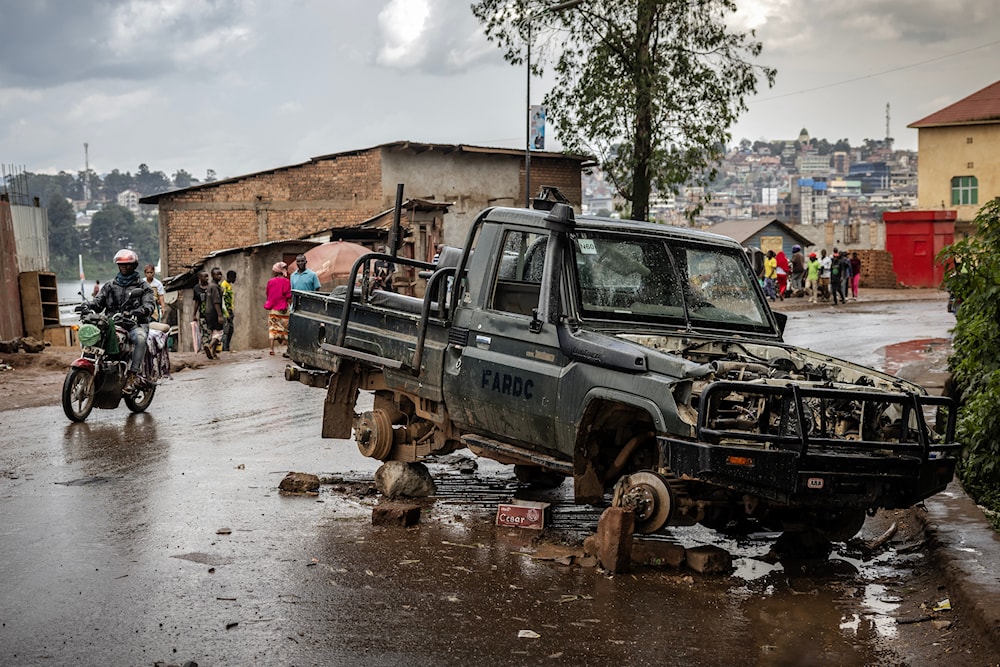Congo army's retreat from Bukavu sparks clashes with allied militias
Burundi has begun withdrawing its forces from the eastern Democratic Republic of Congo, where they had been engaged in battles against M23 rebels.
-

A motorbike driver rides past a vandalized vehicle of the Armed Forces of the Democratic Republic of the Congo (FARDC) following clashes in Bukavu on February 18, 2025. (AFP)
Government forces and local militias have engaged in clashes south of Bukavu, the provincial capital of the eastern Democratic Republic of Congo, as troops retreat in the face of an advance by Rwanda-backed M23 rebels, Reuters reported Tuesday, citing military sources and local residents.
The troops and their militia allies were initially ordered to withdraw from Bukavu—a key trading and mining hub—to avoid urban combat with the rebels and establish defensive positions elsewhere to slow the offensive.
However, the militias insisted on fighting. By the time the rebels began advancing into Bukavu over the weekend, the plan had fallen apart, descending into chaos, a Congolese general, a senior officer, a community leader, and several residents told Reuters.
Having already lost control of Goma, eastern Congo’s largest city near the Rwandan border, the forces tasked with defending Bukavu and its 1.3 million residents hastily abandoned their positions.
While direct confrontations with the M23 were largely avoided, towns south of Bukavu soon became embroiled in violence as pro-government militia fighters, known as the Wazalendo, attempted to disarm or stop retreating and deserting Congolese soldiers.
The M23 rebels, led by ethnic Tutsis and backed by Rwanda, claim they are fighting for their rights. Meanwhile, various armed groups continue to compete for control of the region’s vast mineral wealth, including tantalum and cobalt—critical components for electric vehicles, mobile phones, and other global technologies. Congo is also the leading supplier of copper to China.
Three Congolese military sources stated that the retreat was ordered to prevent the kind of bloodshed seen in Goma’s fall in late January, when approximately 3,000 people were killed, according to the United Nations.
The loss of Kavumu Airport, north of Bukavu, and its crucial air support also factored into the decision to withdraw, an army general explained.
Repeated battlefield defeats have also left Congolese troops demoralized, a senior officer deployed in the conflict zone said.
The renewed fighting has exacerbated an already dire humanitarian crisis in eastern Congo. According to the UN refugee agency, recent clashes have destroyed emergency shelters, leaving around 350,000 displaced people without shelter.
Rwanda denies accusations from Congo, the United Nations, and Western powers that it supports M23 with arms and troops. Kigali insists it is acting in self-defense against a Hutu militia, which it claims is aligned with the Congolese military.
Congo rejects Rwanda’s assertions, accusing Kigali of using proxy militias to exploit its mineral resources.
Read more: UN Chief warns of regional war as M23 captures DRC's Bukavu
Burundi troops withdraw in eastern DRC as M23 rebels expand reach
In a related context, Burundi has begun withdrawing its forces from eastern Democratic Republic of Congo, where they had been engaged in battles against M23 rebels, Reuters reported, citing four sources.
The move deals another setback to the Congolese army as it struggles to contain the rebels’ rapid advance.
The withdrawal comes amid allegations by the UN human rights office that M23 rebels have executed children during their offensive, which has led to the capture of eastern Congo’s two largest cities.
"A number of trucks filled with [Burundian] military arrived in the country since yesterday" via a border post, a Burundian army officer confirmed, corroborating reports from two UN sources and an African diplomat.
Burundian troops had been fighting alongside Congolese forces in a failed bid to defend Kavumu, home to the airport serving Bukavu, the capital of South Kivu province. The rebels’ seizure of the airport over the weekend marks their most significant gain since capturing Goma, eastern Congo’s largest city, in late January.
Burundi has maintained a military presence in eastern Congo for years, initially to target Burundian rebels operating in the region but more recently to support the fight against M23.
Meanwhile, in Geneva, the UN human rights office warned of a worsening humanitarian situation for civilians caught in the conflict, citing reports of summary executions and sexual violence.
"Our office has confirmed cases of summary execution of children by M23 after they entered the city of Bukavu last week," UN spokesperson Ravina Shamdasani said at a press briefing.
She detailed that three boys, believed to be no older than 15, were killed during an altercation with rebels after refusing to surrender weapons they had taken from an abandoned military camp.
Between 10,000 and 15,000 people have fled from around Bukavu into Burundi in recent days, leading to overcrowding and straining resources, according to Matthew Saltmarsh, spokesperson for the UN Refugee Agency.
Some refugees drowned while attempting to cross the Ruzizi River, he added.
Further north, Uganda’s military announced that, with approval from local authorities, it had entered the eastern Congolese city of Bunia to curb militia killings in the area.
Read more: Humanitarian crisis intensifies in East Congo as militants head south

 5 Min Read
5 Min Read










